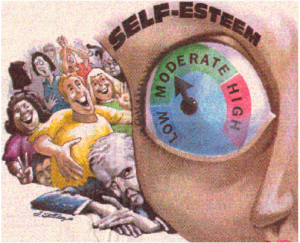I speak to community and professional groups on a variety of topics that deal with motivation, emotion, and psychological well-being. Many of these talks can be tailored to specific audiences such as parents, teachers, retirees, teenagers, or business people. Furthermore, for most topics, presentations can range from 20 to 75 minutes, and I can provide longer workshops as well. If you are interested, you can reach me at leary@duke.edu.
Most Problems are People Problems
 Human behavior is by far the single biggest cause of the problems that we face in life—in our relationships with other people, in our jobs, in society, and within ourselves—and ironically, the people who cause our problems are often us. This presentation examines the central human tendencies that underlie many of our difficulties and discusses strategies for dealing with them.
Human behavior is by far the single biggest cause of the problems that we face in life—in our relationships with other people, in our jobs, in society, and within ourselves—and ironically, the people who cause our problems are often us. This presentation examines the central human tendencies that underlie many of our difficulties and discusses strategies for dealing with them.
The Recipe for Psychological Well-being
 All of us strive to be happy, well-adjusted people who handle the challenges of life effectively. But what does it take to be a well-adjusted person? Researchers have identified a small number of personal characteristics that promote well-being, finding that most people fall into one of only three basic patterns. Although none of us can thrive across the board, we can all take steps to improve how well we manage life.
All of us strive to be happy, well-adjusted people who handle the challenges of life effectively. But what does it take to be a well-adjusted person? Researchers have identified a small number of personal characteristics that promote well-being, finding that most people fall into one of only three basic patterns. Although none of us can thrive across the board, we can all take steps to improve how well we manage life.
Being Human in Hard Times
 The past several years have brought a number of social problems that have increased uncertainty and anxiety for many people. Mass shootings, political strife, economic uncertainty, race relations, social inequities, terrorist threats, and the pandemic are just a few of the problems that are pushing many of us to the breaking point. This presentation examines the emotional and social impact of these modern challenges, along with strategies for dealing with them personally and fostering greater resilience in our children.
The past several years have brought a number of social problems that have increased uncertainty and anxiety for many people. Mass shootings, political strife, economic uncertainty, race relations, social inequities, terrorist threats, and the pandemic are just a few of the problems that are pushing many of us to the breaking point. This presentation examines the emotional and social impact of these modern challenges, along with strategies for dealing with them personally and fostering greater resilience in our children.
Why Mindfulness Matters
 Over the past few years, many claims have been made about the benefits of “mindfulness” for reducing stress, improving relationships, enhancing job performance, and promoting happiness. Based on the latest research in psychology and neuroscience, Mark examines these claims to examine what mindfulness is, what it does, and whether it has the positive effects that have been claimed.
Over the past few years, many claims have been made about the benefits of “mindfulness” for reducing stress, improving relationships, enhancing job performance, and promoting happiness. Based on the latest research in psychology and neuroscience, Mark examines these claims to examine what mindfulness is, what it does, and whether it has the positive effects that have been claimed.
Understanding Self-esteem: Beyond Pop Psychology
 Although self-esteem has long been considered important for success, happiness, and resilience, its role in personal well-being has been poorly understood. In this presentation, Mark debunks popular myths about the nature of self-esteem and examines the important but previously unidentified role that self-esteem plays in human behavior.
Although self-esteem has long been considered important for success, happiness, and resilience, its role in personal well-being has been poorly understood. In this presentation, Mark debunks popular myths about the nature of self-esteem and examines the important but previously unidentified role that self-esteem plays in human behavior.
The Evolution of Human Nature
 Despite the differences that we see among people, all human beings share certain universal characteristics – emotions, motives, and other aspects of human nature that evolved over millions of years. Although these characteristics may have been beneficial among our prehuman ancestors, many of them create emotional, behavioral, and social problems in the modern world. Learn about the origins of human nature and why our basic human characteristics sometimes get us into trouble today.
Despite the differences that we see among people, all human beings share certain universal characteristics – emotions, motives, and other aspects of human nature that evolved over millions of years. Although these characteristics may have been beneficial among our prehuman ancestors, many of them create emotional, behavioral, and social problems in the modern world. Learn about the origins of human nature and why our basic human characteristics sometimes get us into trouble today.
The Paradox of Self-awareness
 The ability to think consciously about ourselves is essential in life, the central characteristic that makes us so different from all other animals. Our ability to think about ourselves is necessary in order to plan for the future, evaluate our progress toward our goals, infer what other people are thinking, and allow us to control our own behavior. Yet, although self-awareness has many benefits and is responsible for the best features of human civilization, it also contributes to many personal and social problems. Learn about the “curse of the self” and how to resist it.
The ability to think consciously about ourselves is essential in life, the central characteristic that makes us so different from all other animals. Our ability to think about ourselves is necessary in order to plan for the future, evaluate our progress toward our goals, infer what other people are thinking, and allow us to control our own behavior. Yet, although self-awareness has many benefits and is responsible for the best features of human civilization, it also contributes to many personal and social problems. Learn about the “curse of the self” and how to resist it.
Self-compassion, Happiness, and Well-being
 Most people are harder on themselves than they need to be, often treating themselves far more harshly than they treat other people. In contrast, people who are self-compassionate treat themselves with the same care and kindness that they treat their loved ones. In the 15 years since self-compassion was first identified as an important determinant of well-being, psychologists have explored what it is, how it works, and how each of us can improve our lives by treating ourselves more compassionately. (Mark also has a special version of this talk that deals specifically with the challenges of growing older.)
Most people are harder on themselves than they need to be, often treating themselves far more harshly than they treat other people. In contrast, people who are self-compassionate treat themselves with the same care and kindness that they treat their loved ones. In the 15 years since self-compassion was first identified as an important determinant of well-being, psychologists have explored what it is, how it works, and how each of us can improve our lives by treating ourselves more compassionately. (Mark also has a special version of this talk that deals specifically with the challenges of growing older.)
We Can’t All Be Right: The Psychology of Intellectual Humility
 Almost everybody overestimates how often they are correct, and our certainty that we are right lowers the quality of our decisions, creates problems in our social relationships, and fosters divisiveness in society. Mark’s ground-breaking research on intellectual humility – the recognition that what you believe might, in fact, be wrong – explores the nature of intellectual humility and its benefits for our personal lives and for society.
Almost everybody overestimates how often they are correct, and our certainty that we are right lowers the quality of our decisions, creates problems in our social relationships, and fosters divisiveness in society. Mark’s ground-breaking research on intellectual humility – the recognition that what you believe might, in fact, be wrong – explores the nature of intellectual humility and its benefits for our personal lives and for society.
The Master Social Motive
 Our behavior is motivated by many things – by desires for security, power, intimacy, achievement, and comfort, to name just a few human motives. But the psychological motive that underlies more of our daily actions than any other is the need for social acceptance and belonging. Mark has spent nearly 30 years studying the role that this powerful desire for acceptance plays in our lives and the impact of social rejection on our emotions and behavior.
Our behavior is motivated by many things – by desires for security, power, intimacy, achievement, and comfort, to name just a few human motives. But the psychological motive that underlies more of our daily actions than any other is the need for social acceptance and belonging. Mark has spent nearly 30 years studying the role that this powerful desire for acceptance plays in our lives and the impact of social rejection on our emotions and behavior.
The Psychology of Impression Management
 The impressions that we make on other people have a profound effect on how they treat us and on our outcomes in life. As a result, people can rarely afford to disregard how they are being perceived and evaluated by others. In this presentation, Mark shares insights from 40 years of research on the central role that impression management plays in our lives, how people manage their social impressions, social anxiety and other problems that arise from excessive concerns with one’s image, and mistakes that people make when they try to make a good impression.
The impressions that we make on other people have a profound effect on how they treat us and on our outcomes in life. As a result, people can rarely afford to disregard how they are being perceived and evaluated by others. In this presentation, Mark shares insights from 40 years of research on the central role that impression management plays in our lives, how people manage their social impressions, social anxiety and other problems that arise from excessive concerns with one’s image, and mistakes that people make when they try to make a good impression.
When the Self Recedes
 We spend most of our lives preoccupied with thoughts about ourselves as we plan, worry, make decisions, evaluate ourselves, ruminate about things that have happened, and try to figure ourselves out. Occasionally, however, our self-thoughts lessen and our chatty minds become quieter. In this presentation, Mark explores the psychological states that arise when thoughts about ourselves recede, such as flow, awe, mindfulness, gratitude, and transcendence.
We spend most of our lives preoccupied with thoughts about ourselves as we plan, worry, make decisions, evaluate ourselves, ruminate about things that have happened, and try to figure ourselves out. Occasionally, however, our self-thoughts lessen and our chatty minds become quieter. In this presentation, Mark explores the psychological states that arise when thoughts about ourselves recede, such as flow, awe, mindfulness, gratitude, and transcendence.
Why You Are Who You Are
 People’s personalities are nearly as distinct as their fingerprints, raising the question of why people differ so much from one another. This presentation takes a whirlwind journey through the primary factors that make each of us the person we are, including the genes we inherit from our parents, our beliefs about ourselves and the world, our personal experiences, and the broader culture in which we live.
People’s personalities are nearly as distinct as their fingerprints, raising the question of why people differ so much from one another. This presentation takes a whirlwind journey through the primary factors that make each of us the person we are, including the genes we inherit from our parents, our beliefs about ourselves and the world, our personal experiences, and the broader culture in which we live.
The Dark Core of Personality
 People who are particularly self-centered, manipulative, unethical, and selfish create many problems for everyone else. Researchers have recently discovered that a single dark personality trait underlies many negative, hurtful characteristics such as narcissism, Machiavellianism, selfishness, moral disengagement, and spitefulness. This presentation explores the aspects of personality that underlie a great deal of harmful and evil behavior.
People who are particularly self-centered, manipulative, unethical, and selfish create many problems for everyone else. Researchers have recently discovered that a single dark personality trait underlies many negative, hurtful characteristics such as narcissism, Machiavellianism, selfishness, moral disengagement, and spitefulness. This presentation explores the aspects of personality that underlie a great deal of harmful and evil behavior.
Healthy Self-interest: How to Watch Out for Yourself without Being Selfish
 Although society puts strong pressures on us not to be selfish, most people struggle at times to balance their own desires against their concerns for other people. As a result, we often err in one direction or the other—either ignoring our own needs or behaving selfishly. This presentation examines the psychology of selfishness and offers insights for how to watch out for ourselves without being selfish.
Although society puts strong pressures on us not to be selfish, most people struggle at times to balance their own desires against their concerns for other people. As a result, we often err in one direction or the other—either ignoring our own needs or behaving selfishly. This presentation examines the psychology of selfishness and offers insights for how to watch out for ourselves without being selfish.
